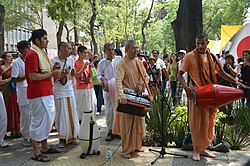|
Hinduism in Mexico
Hinduism in Mexico is a minority religion. There were about 12,601 (0.01%) Hindus in Mexico as of 2020.[2][3] Hindu Population & Demographics
Status of HindusThe Hindus in the country are mainly businessmen or professionals. Many of them work with one or the other international organisation or a multinational corporation.[6] There are also some academics and scientists among them. They have helped to bring about a greater mutual understanding between India and their host country. Most members of the diaspora speak Spanish and have adapted themselves admirably to their foreign environment. TemplesA Sai Baba temple and a Vaishnav temple have been constructed in Mexico City by the Sangam Organisation. There are several center from some other worshippers as well. The country got its first Ram Temple constructed in the city of Queretaro with the idols brought from India.[7] VaishnavasISKCON has 8 centres in Mexico.[8]
Sai OrganisationThere are now 29 Sai centers in Mexico. There are two Sai Schools in Mexico, one in Chihuahua and other in Cuernavaca. There are about 100 children in each school.[9] Hinduism in TijuanaIn Tijuana, Hinduism is practiced in a diverse and diffuse manner among the population. It is found among established Indo-Hindus as well as local believers who, through a process of spiritual seeking, identify themselves as followers of Hindu traditions. A portion of the Indo-Hindu community in Tijuana practices their religion by crossing the border into the United States, particularly to San Diego, California, where they can access religious products imported from their home country and visit Hindu temples. Those without visas to cross the border conduct their practices at home, using small altars. This adaptation in their mobility contexts and within a minority community allows them to adjust rituals to their new environment, while also reshaping gender roles, customs, and their connections with their countries of origin and residence. This situation contrasts with other religions in the region, as Hinduism in Tijuana is not predominantly practiced in congregational settings.[10] See alsoReferences
External links |
||||||||||||||||||||||||||||||||||||||
